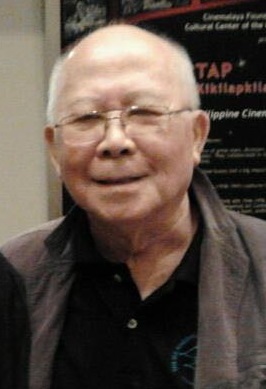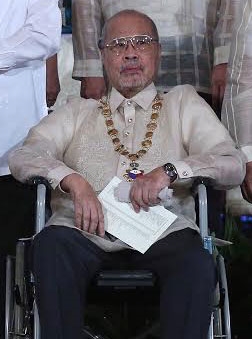
José García Villa was a Filipino poet, literary critic, short story writer, and painter. He was awarded the National Artist of the Philippines title for literature in 1973, as well as the Guggenheim Fellowship in creative writing by Conrad Aiken. He is known to have introduced the "reversed consonance rhyme scheme" in writing poetry, as well as the extensive use of punctuation marks—especially commas, which made him known as the Comma Poet. He used the pen name Doveglion, based on the characters he derived from his own works. These animals were also explored by another poet, E. E. Cummings, in "Doveglion, Adventures in Value", a poem dedicated to Villa.
Philippine literature in English has its roots in the efforts of the United States, then engaged in a war with Filipino nationalist forces at the end of the 19th century. By 1901, public education was institutionalized in the Philippines, with English serving as the medium of instruction. That year, around 600 educators in the S.S. Thomas were tasked to replace the soldiers who had been serving as the first teachers. Outside the academe, the wide availability of reading materials, such as books and newspapers in English, helped Filipinos assimilate the language quickly. Today, 78.53% of the population can understand or speak English.

Cecilia Manguerra Brainard is an author and editor of 20 books. She co-founded PAWWA or Philippine American Women Writers and Artists; and also founded Philippine American Literary House. Brainard's works include the World War II novel, When the Rainbow Goddess Wept, The Newspaper Widow, Magdalena, and Woman With Horns and Other Stories. She edited several anthologies including Fiction by Filipinos in America, Contemporary Fiction by Filipinos in America, and two volumes of Growing Up Filipino I and II, books used by educators.

Bienvenido L. Lumbera was a Filipino poet, critic and dramatist. Lumbera is known for his nationalist writing and for his leading role in the Filipinization movement in Philippine literature in the 1960s, which resulted in his being one of the many writers and academics jailed during Ferdinand Marcos' Martial Law regime. He received the Ramon Magsaysay Award for Journalism, Literature and Creative Communications in 1993, and was proclaimed a National Artist of the Philippines for literature in 2006. As an academic, he is recognized for his key role in elevating the field of study which would become known as Philippine Studies.
J. Neil Carmelo Garcia earned his AB Journalism, magna cum laude, from the University of Santo Tomas in 1990; MA in Comparative Literature in 1995, and PhD in English Studies: Creative Writing in 2003 from the University of the Philippines Diliman. He is a Professor of English, creative writing and comparative literature at the College of Arts and Letters, University of the Philippines Diliman, where he also serves as an Associate for Poetry at the Likhaan: U.P. Institute of Creative Writing.
Gémino Henson Abad is an educator, writer, and literary critic from Cebu, Philippines. He is a National Artist for Literature of the Philippines.
Bino A. Realuyo is a Filipino-American novelist, poet, community organizer and adult educator. He was born and raised in Manila, Philippines but spent most of his adult life in New York City. He is the author of a novel, The Umbrella Country, a poetry collection, The Gods We Worship Live Next Door, and the editor of two anthologies.

Cirilo F. Bautista was a Filipino poet, critic and writer of nonfiction. A National Artist of the Philippines award was conferred on him in 2014.

Marjorie Evasco is a Filipina poet. She writes in two languages: English and Cebuano-Visayan and is a supporter of women's rights, especially of women writers. Marjorie Evasco is one of the earliest Filipina feminist poets. She is a recipient of the S.E.A. Write Award.
Lakambini A. Sitoy is a Filipino author, journalist and teacher. Her novel Sweet Haven was published in French translation by Albin Michel as Les filles de Sweethaven in October 2011, in the original English by the New York Review of Books in 2014, and by Anvil Publishing Inc. in 2015. She received the David T.K. Wong fellowship from the University of East Anglia, Norwich, United Kingdom, in 2003.

Luisa A. Igloria is a Filipina American poet and author of various award-winning collections, and is the most recent Poet Laureate of Virginia (2020-2022).

Nicolas Armada Deocampo, best known as Nick Deocampo, is a multi-awarded Filipino filmmaker, film historian, film literacy advocate, film producer, author and the director of the Center for New Cinema.
Albert B. Casuga, is a Philippines-born Canadian writer. He lives in Mississauga, Ontario, Canada, where he continues to write poetry, fiction, and criticism after his retirement from teaching. He served as an elected member of his region's school board.

Edwin M. Cordevilla, is a poet and journalist based in the Philippines. He is the author of Phoenix and Other Poems, The Occasions of Air, Fire, Water, Earth (2012), and the non-traditional epic poem Ten Thousand Lines Project For World Peace (2013). He is a co-author of the coffee-table book, Marikina: Kapuri-Puri Ka (2002), showcasing the transformation of Marikina from a backward municipality to a vibrant and model city, and the principal author of Duterte Chronicles: The Storm From Davao (2016), a book that re-created the rise of President Rodrigo Duterte from obscurity to the Philippine presidency, covering the years 2014 to 2016.

Michael M. Coroza is a Philippine writer and translator writing in the language of Filipino, and is a S.E.A. Write Award laureate.
Nick Carbó is a Filipino-American writer from Legazpi, Albay, Philippines. Carbó writes poetry, essays, and edits magazines and anthologies. He is primarily known for his book of poetry titled Secret Asian Man (2000) Tia Chucha Press which won the Asian American Writers Workshop's Readers Choice Award. He also won the 2005 Calatagan Award from the Philippine American Writers & Artists for his book Andalusian Dawn (2004) Cherry Grove Collections. His most noted award is the 1999 Gregory Millard/New York City Department of Cultural Affairs New York Foundation for the Arts Fellowship.
Kaya Press is an independent non-profit publisher of writers of the Asian and Pacific Islander diaspora. Founded in 1994 by the postmodern Korean writer Soo Kyung Kim, Kaya Press is currently housed in the Department of American Studies and Ethnicity at the University of Southern California.

Dominador “Dom” Ibarra Ilio was a poet and professor born in Malinao, Capiz. He is considered a pioneer of Philippine literature in English as a recognized poet and author both in the Philippines and in the United States. He was an engineer by profession.
Mary Racelis-Hollsteiner is a Filipino sociologist, anthropologist, and development worker. She has been a faculty member at the Ateneo de Manila University in the Philippines since 1960, becoming the first female professor at the university.
Anarchism in the Philippines has its roots in the anti-colonial struggle against the Spanish Empire, becoming influential in the Philippine Revolution and the country's early trade unionist movement. After being supplanted by Marxism-Leninism as the leading revolutionary tendency during the mid-20th century, it experienced a resurgence as part of the punk subculture, following the fragmentation of the Communist Party of the Philippines.









